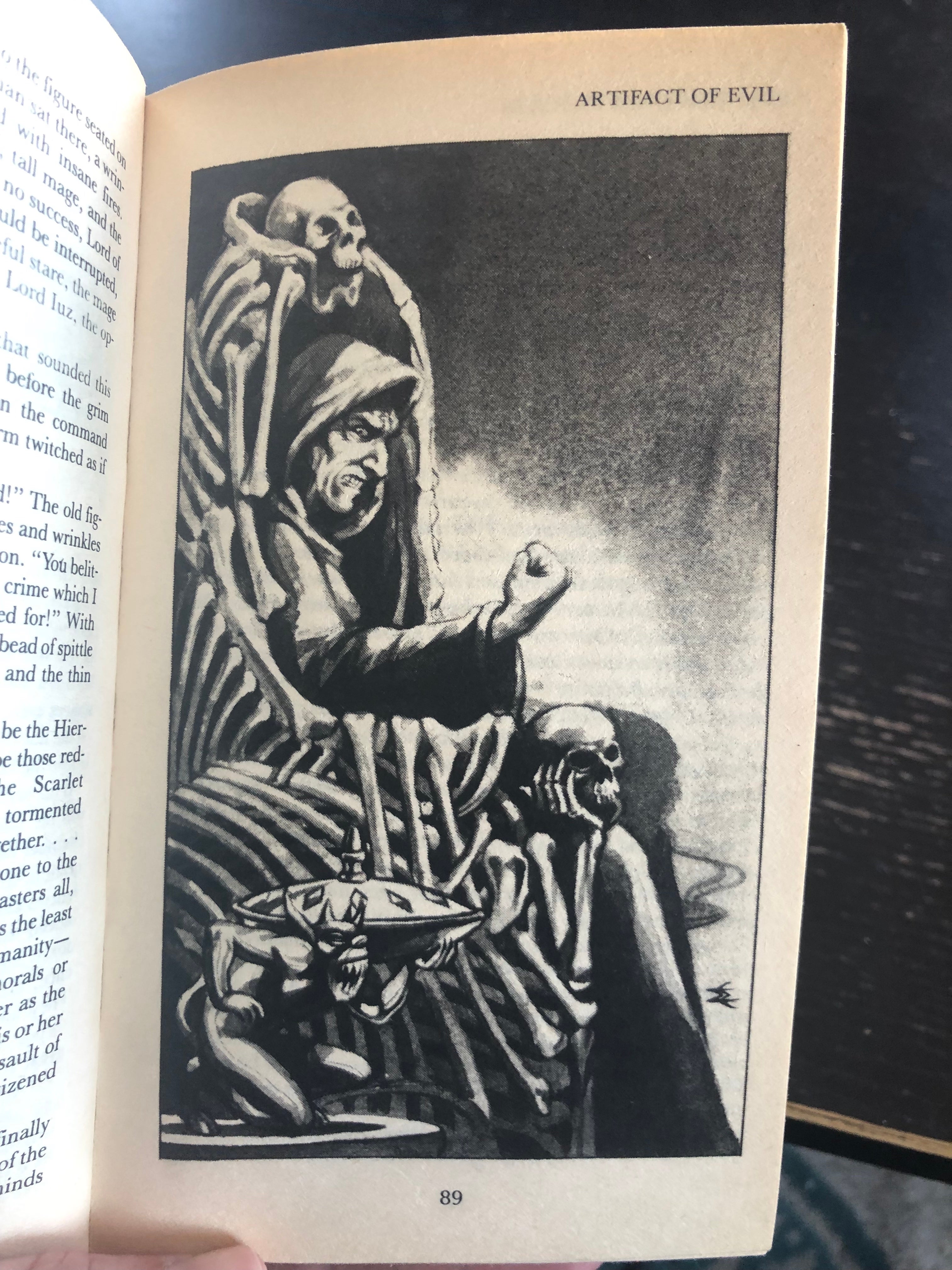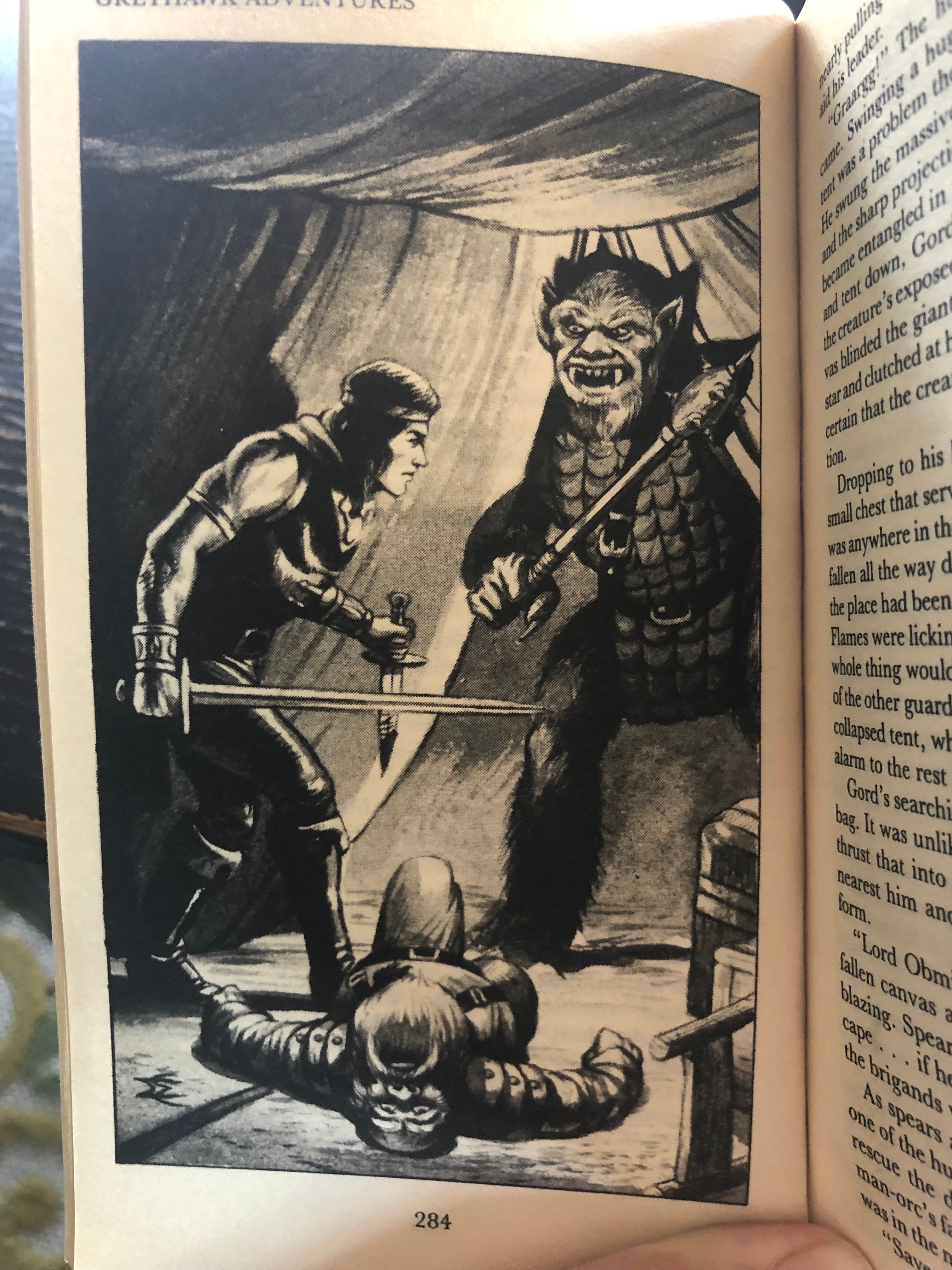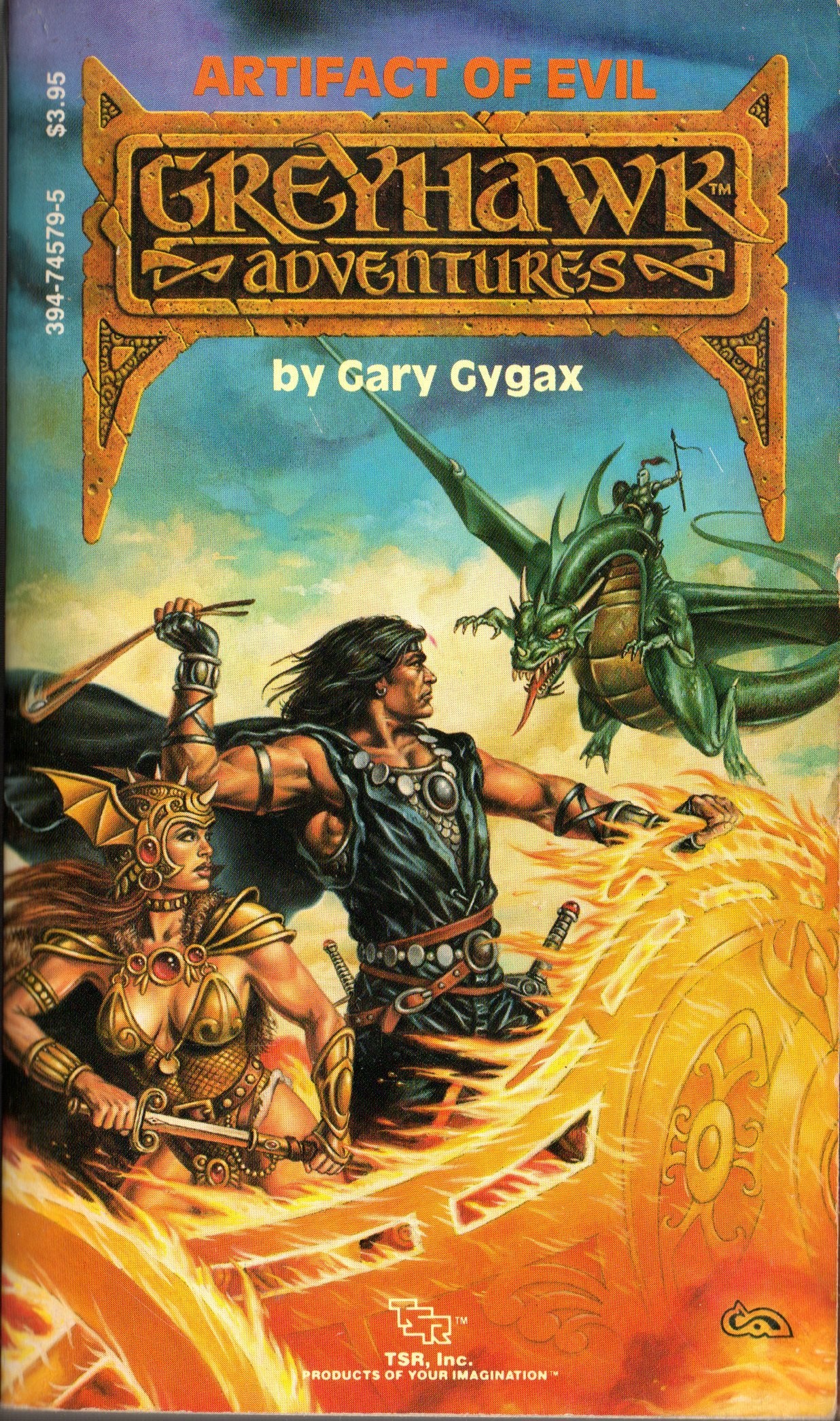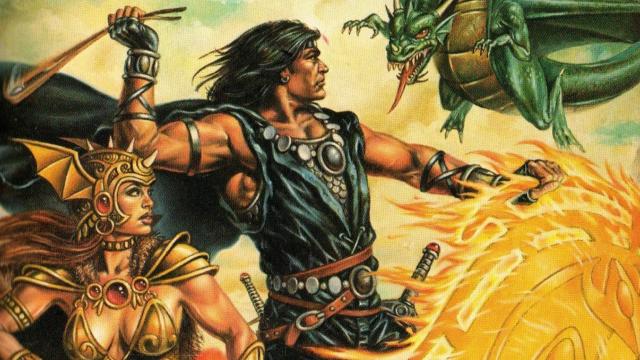Having treated myself to several good Dungeons & Dragons novels in a row — mainly the original Dragonlance trilogy and R.A. Salvatore’s The Halfling’s Gem — in the last few D&D&N columns, I knew that I must pay a price in return. That price was reading Artefact of Evil, the second Greyhawk novel by D&D co-creator Gary Gygax, whose first Greyhawk book currently sits as the worst entry I’ve read so far. Is Artefact any better? Yes, but not nearly enough.
Let me begin with the same caveat as last time: You can venerate Gary
Gygax as the father of all table-top role-playing games (and the many, many things spawned from them) while still thinking he’s a piss-poor fiction author, and I do, because he is. But let’s start with what’s been improved since Saga of Old City, which is mainly that main character Gord the Rogue, first introduced as a bug-eating, constantly abused slave boy who became a shockingly over-powered fighter/master thief by the end of Saga, is something more akin to a hero in that he starts fighting with the good guys to stop the forces of evil, instead of solely for adventure… eventually.
Those forces of evil include the cult of the Scarlet Brotherhood, which is hunting for an evil artefact that can awaken the evilest god in all of creation and free him from his prison. Unfortunately, Iuz, a half-demon wizard also wants the power of the artefact for himself to rule the Earth — sorry, Oerth — and sends his minion Obmi the dwarf and a small army to find the artefact as well. So there are three factions searching for the titular artefact, two of whom are evil as heck.
Spoiler: Obmi does find and successfully bring the artefact back to Iuz, with Gord and his companions chasing him every step of the way but never catching up to him. The novel ends with darkness falling across the land, and then Gord gets mauled by a wild boar and dies. Seriously. Gygax’s decision to make Gord and his fellow heroes fail — not fail spectacularly, they just don’t get the job done — genuinely surprised me, while Gord’s brutal death made me laugh out loud. It’s a bit of fun, which is otherwise in short supply in Artefact of Evil.

The biggest problem, as before, is that Gygax’s plotting is just a mess. A quest to stop a bunch of bad guys from retrieving a magical item of great power is Fantasy Fiction 101, and should be straightforward enough. But Gygax introduces the Scarlet Brotherhood as a cult with secret members hiding in even the tiniest of villages, only to drop them entirely from the proceedings about a quarter of the way in, replacing them with Iuz and his minions. Gord and his pals have about a million random combat encounters with monsters, Iuz’s army, and more along the way in lieu of an actual, ongoing narrative.
Their biggest encounter — in size, at any rate — is with the Lovecraftian horror called Putriptoq. In order, here’s how this goes: one of Gord’s party senses the monstrous creature is ahead. Gord has a random thought and looks into his magical bag of holding and pulls out a scroll which just so happens to contain the magic spell “Banishment,” the exact thing he happens to need to get rid of Lovecraftian horrors he can’t otherwise battle. Putriptoq arrives and Gord casts the spell he’s had in his hands for less than a minute; the only twist is that Gord inexplicably ad-libs a little bit of the spell and ends up getting himself and his party transported to a plane ruled by some sort of cat god. It would be a fun diversion if it didn’t exist solely so Master Cat can inform Gord he’s been wearing a ring that can turn him into a were-panther. By the way, Putriptoq doesn’t play a part in the rest of the book.
When Gord and the others return to Oerth, the book picks up some, because it focuses on his attempt to stop Obmi from bringing the artefact to Iuz — although this mainly amounts to another slew of battles where Gord and his crew pick off as many foes as they can without being caught. These fights are nothing more than a small showcase for the various character classes, powers, and magic to be found in Dungeons & Dragons, but at least there’s no deus ex machina to ruin the momentum. There’s still no ongoing narrative, and certainly no character development for any of the characters, but at least there’s a clear goal, which marks a major improvement over Old City.
Gord, as a character, has improved somewhat marginally as well. He’s less obnoxious, less dour, and even a bit jovial. Even his casual and not-so-casual misogyny has been toned down, although that doesn’t mean it’s gone. When the first female character wanders into the narrative — a powerful female knight named Dierdre — and drops her second line of dialogue, Gygax writes, “Gord disliked this brash woman instantly… she was too big, too much like a man, and too loud and sure of herself.” Later, he confirms he dislikes Diedre because she’s “condescending” to men as if they’re on her level, rather than acknowledging she’s — possibly — on theirs, and later he publicly announces how much he doesn’t want to have sex with her. Gord still sucks. I hate Gord.

Otherwise, Artefact of Evil has the same problems Saga of Old City had: 1) a million proper nouns of locations with absolutely no hints of what their deal is or what role, if any, they’ll play in the story; 2) a million character names, almost none of whom have any memorable characteristics to keep them in your head for more than a few scenes; and 3) pages and pages of descriptions of things with as little dialogue as Gygax can get away with, possibly because none of his characters are distinguishable from each other in speech or in action. Here’s the most egregious example, after someone (quite reasonably) asks Gord to tell everyone where the hell he got his hands on a scroll of banishment:
“Gord complied, briefly relating a strange encounter in a strange place. ‘Then,’ the young thief said to his comrade, ‘we learned the extent of our folly, for many unexpected and unpleasant things befell us thereafter.’”
That’s it. Gord tells an anecdote you don’t get to hear. I guess it’s not as bad as “each of them discovered facts about the other” in Old City but man, it isn’t good. Nor is Artefact of Evil.
After Artefact was published, Gygax was forced out of TSR, the company he helped create, but took the rights to Gord and his other book characters with them. He then continued Gord’s story for five more novels under the “Gord the Rogue” banner, which ended with Gygax blowing up his version of the world of Greyhawk because he was so irked with the direction TSR had taken their version of his beloved campaign setting (which was nowhere). Even in this mortal realm, where I’ve devoted my life to watching bad movies and reading bad books, reading more about Gord feels like a zero-sum game to me, so let’s say goodbye to the unlikeable protagonist and remember him as we last saw him — turned into a fine mist of blood by a very angry boar.
Artefact of Evil rolls a 5 on a d20, making it a bit higher than Saga of Old City’s original 4. But whereas Saga took a -2 penalty for general unpleasantness and lack of a coherent narrative, Artefact avoids it by being mostly ok and kind of having a coherent narrative. However, both books still earn a -3 penalty for needless misogyny, so Artifact of Evil ends with a 2. Not good, but… no. It’s simply not good. If you somehow manage to track a copy down, stop tracking that copy down immediately.
If you’re a Greyhawk fan dismayed that I won’t be reading any more of Gygax’s novels, good news: author Rose Estes took over the Greyhawk novels after Gygax’s departure, so I’ll definitely look into those Gord-free adventures… eventually. Instead, next up for D&D&N is Pool of Radiance, the novelization of the hit 1988 PC game that I’ve never once played, written by James Ward and Jane Cooper Hong. It’ll be good to take a dip in some magical waters to wash all this Greyhawk off me.

Assorted Musings:
- If you’re curious to know exactly how much of a Mary Sue ol’ Gord has become by book two, he defeats a green dragon by hitting its rider in the head with a single stone from his sling. When he comes to the Plane of Cats, he wins a mini-Olympics against a bunch of were-tigers in every category but racing.
- Artefact of Evil introduces a lot of names I know from regular AD&D Second Edition, mainly from spells: Melf of Melf’s Acid Arrow, Tenser of Tenser’s Floating Discs, Mordenkainen of Modernkainen’s Magnificent Mansion. They all show up very briefly, are vaguely helpful, and disappear without exhibiting any personality at all.
- There is a demon named Schwartz. Make of that what you will.
- Pretty much everyone in both evil factions schemes against each other and themselves, but the cold war between Iuz and his demon father Grazz’t takes up a lot of real estate in the book to very little result. However, Iuz does manage to have his mother, Iggwilv, and consort, Zuggtmoy, freed to join him in his evil quest, but can you believe this? Once they arrive, these two women nag poor Iuz to death! Yes, Iuz commands literal armies of killers, but Iggwilv manages to snag the artefact from Obmi first and won’t give it to Iuz — literally, Iuz, lord of darkness, master of thousands of monsters, whines to himself, she “won’t give it to him” — and now his mum and gal pal get to tell him exactly what to do. Dames, amirite?
- OK, I gotta confess, instead of getting gored to death by a bull, Gord gets teleported to the Plane of Cats because…. wait for it… the ring also gives him nine lives. The book ends with a sexy were-tiger obliquely promising to screw him, so I prefer my ending.
